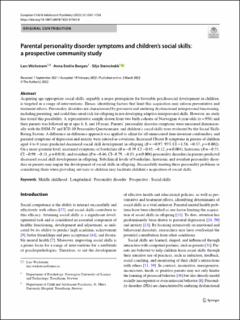| dc.description.abstract | Acquiring age-appropriate social skills, arguably a major prerequisite for favorable psychosocial development in children, is targeted in a range of interventions. Hence, identifying factors that limit this acquisition may inform preventative and treatment efforts. Personality disorders are characterized by pervasive and enduring dysfunctional interpersonal functioning, including parenting, and could thus entail risk for offspring in not developing adaptive interpersonal skills. However, no study has tested this possibility. A representative sample drawn from two birth cohorts of Norwegian 4-year-olds (n = 956) and their parents was followed up at ages 6, 8, and 10 years. Parents’ personality disorder symptoms were measured dimensionally with the DSM-IV and ICD-10 Personality Questionnaire, and children’s social skills were evaluated by the Social Skills Rating System. A difference-in-difference approach was applied to adjust for all unmeasured time-invariant confounders, and parental symptoms of depression and anxiety were entered as covariates. Increased Cluster B symptoms in parents of children aged 4 to 6 years predicted decreased social skill development in offspring (B = −0.97, 95% CI −1.58, −0.37, p = 0.002). On a more granular level, increased symptoms of borderline (B = −0.39, CI −0.65, −0.12, p = 0.004), histrionic (B = −0.55, CI −0.99, −0.11, p = 0.018), and avoidant (B = −0.46, CI−0.79, −0.13, p = 0.006) personality disorders in parents predicted decreased social skill development in offspring. Subclinical levels of borderline, histrionic and avoidant personality disorders in parents may impair the development of social skills in offspring. Successfully treating these personality problems or considering them when providing services to children may facilitate children’s acquisition of social skills. | en_US |

